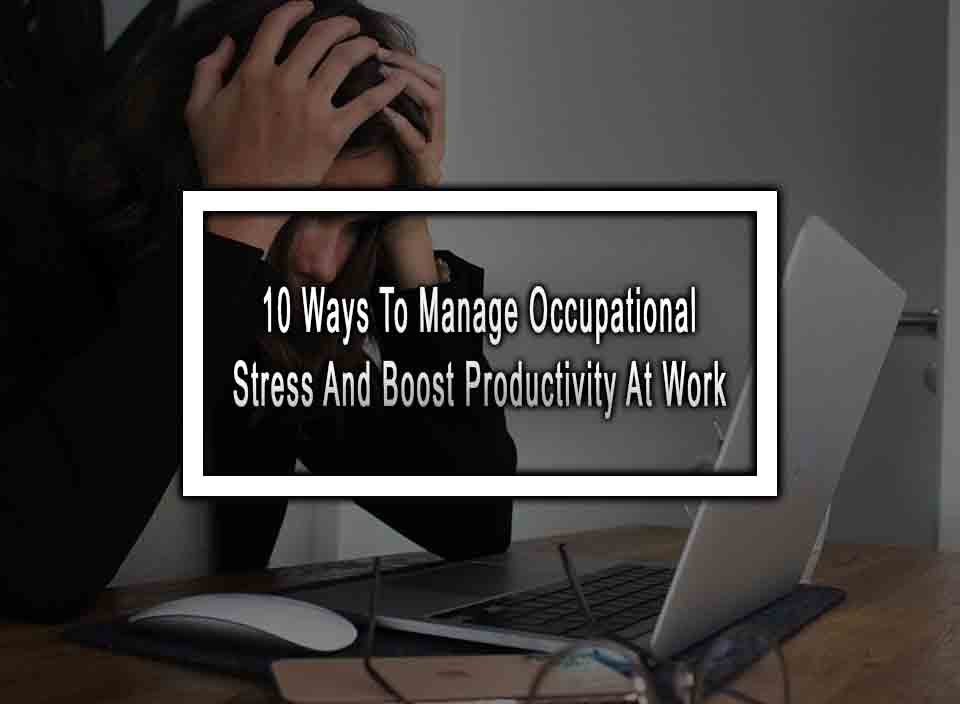Table of Contents
ToggleHere Are Some Ways to Manage Occupational Stress
Occupational stress is a common issue in the workplace that can lead to decreased productivity, absenteeism, and even burnout. With the growing workload and fast-paced work environment, it’s crucial to take care of yourself and find ways to manage occupational stress. In this listicle, we’ve compiled 10 effective strategies to help you stay productive while reducing stress levels.
1. Identify your stressors
To manage occupational stress, the first step is to identify the sources of stress. Take a closer look at your work environment to understand what triggers anxiety, stress, and discomfort. Are you constantly juggling multiple tasks, dealing with a difficult boss or coworker, or struggling to meet deadlines? Identifying your stressors can help you develop effective coping strategies to address them.
2. Prioritize self-care
Taking time to take care of yourself is a crucial step in reducing occupational stress. Prioritize your physical and emotional well-being by getting enough sleep, eating healthy foods, and engaging in physical activity during your breaks.
3. Practice mindfulness meditation
Mindfulness meditation is a powerful tool to reduce stress and promote relaxation. Take a few minutes each day to sit quietly and focus on your breathing. Mindfulness meditation can help you slow down, release tension and anxiety, and improve your emotional well-being.
4. Organize your workspace
A cluttered workspace can increase stress levels and decrease productivity. Take the time to organize your desk, files, and supplies to minimize distractions and create a more efficient work environment.
5. Communicate with your colleagues
Effective communication is essential in the workplace to promote teamwork, resolve conflicts, and reduce stress levels. Take the time to communicate with your colleagues and work together towards common goals.
6. Take breaks and rest
Rest and relaxation are crucial for maintaining productivity and managing occupational stress. Take short breaks throughout the day to stretch, walk around, or meditate. Find opportunities to rest and recharge during your workday to boost your energy levels.
7. Plan and prioritize your tasks
Effective time management can go a long way in reducing occupational stress. Prioritize your tasks and break them down into smaller, manageable steps. Use tools like to-do lists or calendars to plan your day and stay on track.
8. Stay active during the workday
Physical activity during the workday can help reduce stress levels and boost productivity. Take the stairs instead of the elevator, go for a walk during lunch, or practice desk stretches to stay active and energized.
9. Build a support system
Having a support system at work can help reduce stress levels and promote emotional well-being. Build positive relationships with your colleagues and find a mentor or friend to turn to during challenging times.
10. Seek professional help
When occupational stress becomes overwhelming, seek professional help. Your company may offer employee assistance programs, counseling services, or other resources to help you manage stress and promote mental health.
Conclusion
Occupational stress can have a significant impact on your productivity and well-being. By implementing these 10 strategies, you can better manage stress levels and promote a healthy, productive work environment. Remember to prioritize self-care, communicate effectively, and seek help when needed. With these tools, you can stay focused, motivated, and successful in your career.
Occupational Stress FAQ
Here are the most common questions about occupational stress.
Why is occupational stress problematic?
Occupational stress can affect an individual’s mental and physical health and may lead to burnout, reduced job satisfaction, and decreased performance. It can also result in high turnover rates and absenteeism, which can be costly for organizations.
How can occupational stress be managed?
Occupational stress can be managed by identifying and addressing the causes of stress, such as excessive workload or poor work-life balance. Strategies to manage occupational stress may include stress reduction techniques such as meditation and exercise, time management, and effective communication with colleagues and supervisors.
What are some legal protections for employees experiencing occupational stress?
Depending on the jurisdiction, there may be legal protections or accommodations for employees experiencing this stress, such as reasonable accommodations for mental health conditions under disability law, or protections under occupational health and safety laws.












